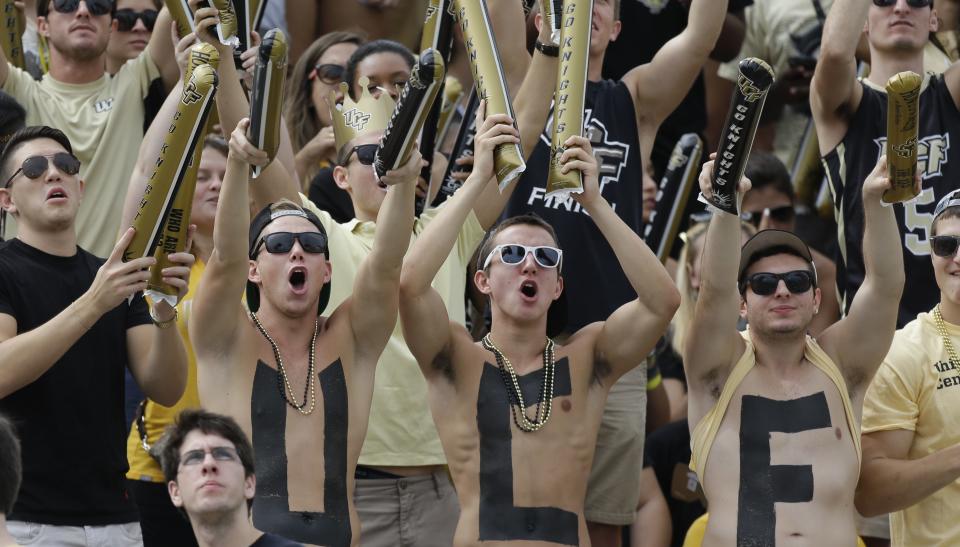Why one AD says the CFP 'is not a real playoff'
Riding a 20-game winning streak, including a 7-0 record this season, Central Florida athletic director Danny White accepted the Knights’ 12th-place ranking in the initial College Football Playoff rankings with a measure of perspective.
“It was an improvement from last year,” White said.
UCF was ranked 18th then before climbing to No. 12 in the last poll before bowl season. Then it went out and beat Auburn in the Peach Bowl to go 13-0. So, the Knights are starting where they finished, which is still a long way from the promised land of the top four and a playoff berth.
All of it begs a simple question: While technically possible, can UCF, or any team from a so-called non-power conference, really ever get a playoff berth?
“If we go undefeated two straight years and we don’t get in, I’d say it’s impossible,” White said. “Not many times in the history of college football has a team gone undefeated in two consecutive seasons.
“So, if our team takes care of business, I think we’ll find out if it is possible,” White concluded.

Right now, it isn’t looking too good. Yes, UCF has won 20 in a row, but the playoff selection committee can’t consider 2017 accomplishments. Or at least they aren’t supposed to consider them.
This is 2018 and while UCF blew out Pittsburgh of the ACC, the Panthers aren’t particularly good this season. Another game against North Carolina was cancelled due to a hurricane, although the Tar Heels aren’t any good either. Other than that, it’s been a slew of weaker teams from UCF’s league, the American Athletic Conference.
“They are the only team in the country that has not played a game against a team that currently has a winning record,” said Rob Mullens, the committee chairman and athletic director at Oregon.
Considering that, the Knights are actually getting some respect. The committee wasn’t wrong to slot UCF where they did. It’s a pretty fair ranking.
“Data is one piece of it,” Mullens said. “When you watch them play … that goes into the mix … It’s part of the data, including the strength of schedule, but it’s also part of what you see in the eye test.”
The schedule gets tougher from here. Temple (5-3) visits Orlando on Thursday. Games with Cincinnati (7-1) and South Florida (7-1) are still to come. A 7-1 Houston team, which should be ranked but isn’t, looms as a possibility in the conference title game.
Anything can happen but that still may not be enough in a sport with 130 teams but just four playoff spots.
The main trouble for UCF is the disparity of scheduling, with the Knights struggling to get potentially higher-ranked teams to play them. They can win and win and win and still not earn enough respect in a sport that strangely rejects the possibility of underdogs and clings to subjective measurements.
One thing White laments is that in college football, more than any other sport, validation of a program’s strength is significantly influenced by another non-quantifiable aspect – recruiting rankings.
Conventional wisdom says that the more players a school signs that have been deemed good by scouts, the better the team must be. What actually gets out on the field is secondary.
“The sport that is the hardest to predict what a recruit will do at the college level is football,” White said. “There are so many variables. There is just so much data out showing that it doesn’t make a whole lot of difference if you are a five-star and a four-star as opposed to a three-star.”
In that Peach Bowl last year, Auburn arrived with four recruiting classes that averaged 8.7 in the nation, per Rivals.com. UCF’s average class rank was 61.5. Yet the Knights won. Plus, both teams had four players picked in the 2018 NFL draft.
“There tends to be this elitist mentality that it does matter and that takes away from the real competition,” White continued. “There’s this assumption that a team can’t compete with that. Well, let’s find out. Let’s settle it on the field.”
To do that, UCF needs to draw a royal flush and get the nod from the committee or the playoff needs to expand.
An eight-team playoff with automatic bids to the Power Five conferences and three at-large bids, with perhaps a mechanism where any unbeaten or highly ranked squad is slotted in, would solve the UCF problem, among many others.
All conference races would matter nationally. Revenue would increase. The season would have an actual flow to it. And if a team such as UCF proves unworthy as the No. 8 seed, well, consider getting to play a weaker opponent a reward finishing No. 1.
“Right now, it is not a real playoff,” White said. “It’s an invitational. You can’t call it a playoff when a team can win every game and not have a chance to play for the championship.”
That’s reality. The four-team playoff was a major step up from the two-team BCS. It isn’t enough, though.
“Four is better than two but eight is better than four,” White said. “It’s silly we can’t figure out how to settle this on the field.”
Oh, the powers that be in college football can figure it out. It’s just that they don’t want to figure it out. It’s easier to ignore the Knights than to find out just how good they are.
More from Yahoo Sports:
• Ugly foul on former MVP draws police to NBA court
• Coach calls illegal timeout and retires on the spot
• Winners and losers at the NFL trade deadline
• Terez Paylor: Why KC stood pat at trade deadline

